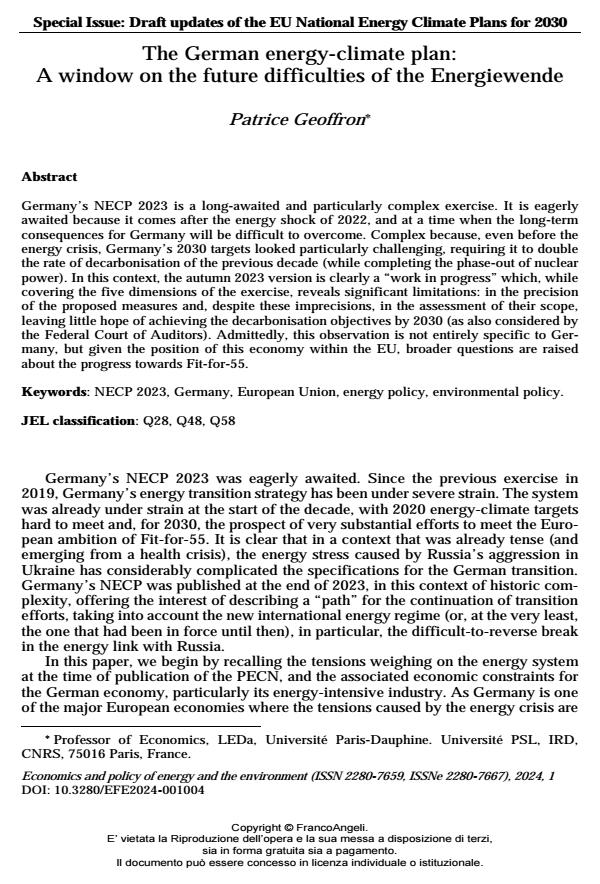The German energy-climate plan: A window on the future difficulties of the Energiewende
Titolo Rivista ECONOMICS AND POLICY OF ENERGY AND THE ENVIRONMENT
Autori/Curatori Patrice Geoffron
Anno di pubblicazione 2024 Fascicolo 2024/1
Lingua Inglese Numero pagine 12 P. 43-54 Dimensione file 153 KB
DOI 10.3280/EFE2024-001004
Il DOI è il codice a barre della proprietà intellettuale: per saperne di più
clicca qui
Qui sotto puoi vedere in anteprima la prima pagina di questo articolo.
Se questo articolo ti interessa, lo puoi acquistare (e scaricare in formato pdf) seguendo le facili indicazioni per acquistare il download credit. Acquista Download Credits per scaricare questo Articolo in formato PDF

FrancoAngeli è membro della Publishers International Linking Association, Inc (PILA), associazione indipendente e non profit per facilitare (attraverso i servizi tecnologici implementati da CrossRef.org) l’accesso degli studiosi ai contenuti digitali nelle pubblicazioni professionali e scientifiche.
Germany’s NECP 2023 is a long-awaited and particularly complex exercise. It is eagerly awaited because it comes after the energy shock of 2022, and at a time when the long-term consequences for Germany will be difficult to overcome. Complex because, even before the energy crisis, Germany’s 2030 targets looked particularly challenging, requiring it to double the rate of decarbonisation of the previous decade (while completing the phase-out of nuclear power). In this context, the autumn 2023 version is clearly a “work in progress” which, while covering the five dimensions of the exercise, reveals significant limitations: in the precision of the proposed measures and, despite these imprecisions, in the assessment of their scope, leaving little hope of achieving the decarbonisation objectives by 2030 (as also considered by the Federal Court of Auditors). Admittedly, this observation is not entirely specific to Ger- many, but given the position of this economy within the EU, broader questions are raised about the progress towards Fit-for-55.
Parole chiave:NECP 2023, Germany, European Union, energy policy, environmental policy
Jel codes:Q28, Q48, Q58
- Energy renovation challenges in dense low-income neighbourhoods with fragmented ownership: insights from Dortmund–Nordstadt, Germany Stefano Cozzolino, Lisa Haag, in Town Planning Review /2025 pp.1
DOI: 10.3828/tpr.2025.37
Patrice Geoffron, The German energy-climate plan: A window on the future difficulties of the Energiewende in "ECONOMICS AND POLICY OF ENERGY AND THE ENVIRONMENT" 1/2024, pp 43-54, DOI: 10.3280/EFE2024-001004